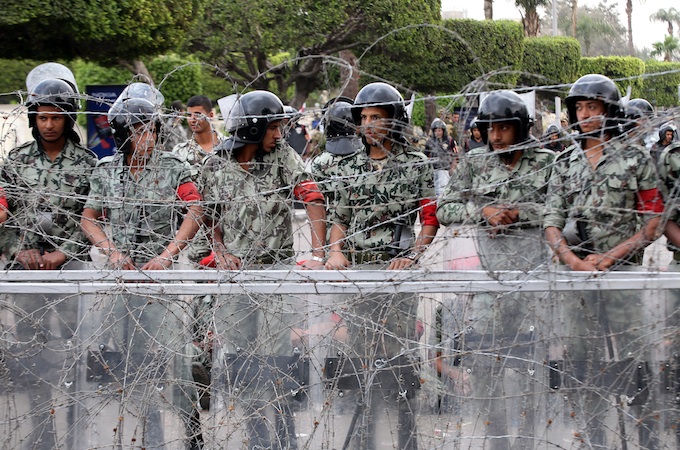
The decree will remain in effect at least until a new constitution is drafted, according to the justice ministry [EPA]
Last Modified: 13 Jun 2012 23:57
Courtesy Of "Al-Jazeera"
Egypt's justice ministry has issued a decree allowing military police and intelligence officers to arrest civilians suspected of crimes, restoring some of the powers of the decades-old emergency law which expired just two weeks ago.
The controversial order was drafted earlier this month, but was not announced until Wednesday.
The decree applies to a range of offences, including those deemed "harmful to the government," destruction of property, "obstructing traffic," and "resisting orders".
Several of those provisions would allow the military to detain peaceful protesters. Rallies in Tahrir Square routinely disrupt traffic, for example.
Members of parliament voted on Tuesday to appoint a constitutional assembly, but the process of drafting the document could take months.
Adel al-Mursi, the head of Egypt's military justice, was quoted by AFP news agency as saying that "the decision fills a legal vacuum", while Sayyed Hashim, a former military prosecutor, called it a temporary measure.
"The police force has not yet recovered completely, and security is not back," Hashim was quoted by Associated Press news agency as saying in a television interview.
Parliament Bypassed
Al Jazeera's Rawya Rageh, reporting from Cairo, said Egyptian activists see the current order as "much worse than the [previous] emergency law", in that it is seen as expanding the military's power.
"And it comes at a time when the ruling military council is expected to be handing over authority to a civilian authority in less than two weeks' time," she said, adding that the order bypassed the newly elected parliament.
"The initial reactions from the MPs has been very angry, specifically from the powerful Muslim Brotherhood.
Some of its members are saying that this is tantamount to a military coup."
The Muslim Brotherhood's Freedom and Justice Party (FJP), which has the largest number of seats in parliament, issued a statement on the controversial decree, suggesting that parliament will try to bring the issue under its supervision.
The brief statement quoted the party's deputy president, Essam El Erian, as saying parliament will be looking into the justice ministry's right to issue the decision and whether parliament can refuse it or not.
Parliament will seek to have oversight over the implementation of the decision "so that this mandate doesn't exceed its legal and constitutional limits," El Erian said in the statement.
"The Egyptian Revolution happened to get rid of injustice, corruption, autocracy and repression of freedoms - and the Egyptian people won't accept the return of any of that."
'Military Coup'
Mohamed Beltagy, another FJP member of parliament, called the decree a "military coup" in an interview with Al Jazeera, and said the measure was not discussed in parliament.
Mohammed Morsi, the Muslim Brotherhood's presidential candidate, said on Al Jazeera that the decision raises fears about the military's role.
Human rights organisations were also quick to criticise the decision, which they said confirmed that Egypt was a "military state".
Gamal Eid, a prominent human rights lawyer, said the decree made Egypt look like "a banana republic".
"Several of the crimes included in the decree are actually rights, such as the right to freedom of expression against ruling powers or established laws, demonstrations and strikes," according to a statement issued by 15 Egyptian rights groups.
The military has played an extensive and controversial role in the justice system over the last 18 months. More than 12,000 civilians have been hauled before military tribunals since the revolution; rights groups say the military courts do not provide basic standards of due process.
The 31-year-old state of emergency, imposed in 1981 after Anwar Sadat was assassinated, was finally allowed to expire at the end of May. It granted wide-ranging powers to former president Hosni Mubarak's security forces, including the right to detain suspects without trial.
Court Rulings
Amr Hamzawy, a liberal member of parliament from Cairo, said in a statement on his Facebook page that the ruling simply "reproduced" the emergency law.
"[It] reproduces the emergency law using new tools and threatens the state of law, for it gives military intelligence and military police powers of judicial execution in crimes committed by civilians," he wrote.
The decree comes just days before the country's presidential runoff, which pits Morsi against Ahmed Shafiq, the last prime minister in Mubarak's government.
It also comes a day before two crucial court rulings. The supreme constitutional court will decide on Thursday whether to expel Shafiq from the race because of the so-called "political isolation" law, which bars ex-regime officials from running for public office.
The court will also rule on whether parliament is unconstitutional; a lower court found that some provisions of the electoral law - allowing political parties to compete with independent candidates for some seats - might have violated the constitution.




No comments:
Post a Comment